口译教程文本1
- 格式:docx
- 大小:19.03 KB
- 文档页数:2
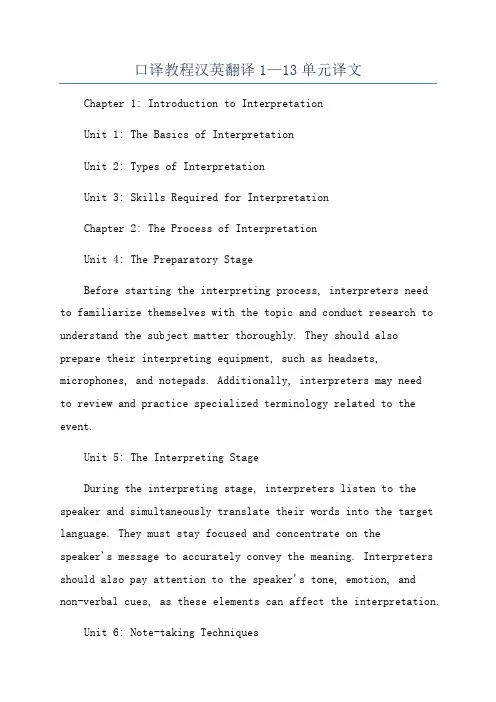
口译教程汉英翻译1—13单元译文Chapter 1: Introduction to InterpretationUnit 1: The Basics of InterpretationUnit 2: Types of InterpretationUnit 3: Skills Required for InterpretationChapter 2: The Process of InterpretationUnit 4: The Preparatory StageBefore starting the interpreting process, interpreters need to familiarize themselves with the topic and conduct research to understand the subject matter thoroughly. They should also prepare their interpreting equipment, such as headsets, microphones, and notepads. Additionally, interpreters may needto review and practice specialized terminology related to the event.Unit 5: The Interpreting StageDuring the interpreting stage, interpreters listen to the speaker and simultaneously translate their words into the target language. They must stay focused and concentrate on thespeaker's message to accurately convey the meaning. Interpreters should also pay attention to the speaker's tone, emotion, and non-verbal cues, as these elements can affect the interpretation.Unit 6: Note-taking TechniquesNote-taking is an essential skill for interpreters.Effective note-taking allows interpreters to retain important information and assist with memory recall during interpretation. Interpreters should develop their own note-taking system and use abbreviations and symbols to jot down key points quickly. However, note-taking should not interfere with active listening and immediate interpretation.Chapter 3: Consecutive InterpretationUnit 7: Introduction to Consecutive InterpretationConsecutive interpretation involves listening to one or several sentences in the source language and then reproducing them in the target language. It requires good memory retention and the ability to accurately convey the meaning. Interpreters should take notes and use their notes as a reference during the interpretation.Unit 8: The Techniques of Consecutive InterpretationInterpreters use several techniques during consecutive interpretation to ensure accurate and fluent delivery. These techniques include paraphrasing, summarizing, clarifying ambiguous statements, and maintaining natural rhythm and pacing. Interpreters should also adapt their interpretation style to match the speaker's tone and style.Unit 9: Consecutive Interpretation PracticeInterpreters can practice consecutive interpretation by engaging in role plays or shadowing experienced interpreters. They can also utilize practice materials, such as speeches, interviews, or articles, to improve their interpretation skills. Regular practice is essential for enhancing memory retention, improving fluency, and perfecting delivery.。

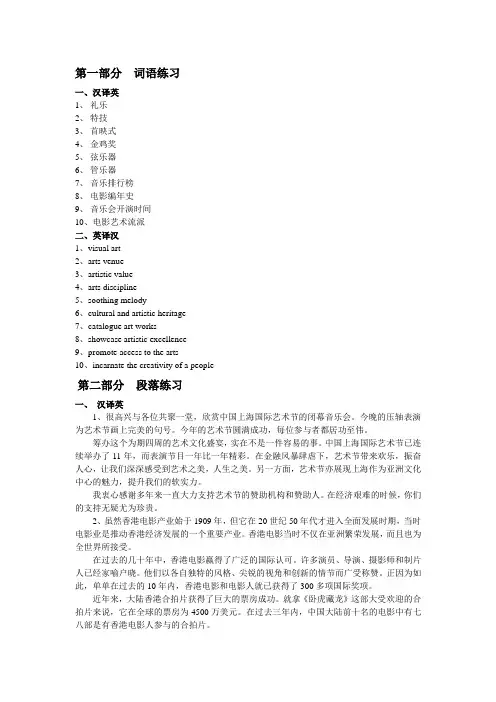
第一部分词语练习一、汉译英1、礼乐2、特技3、首映式4、金鸡奖5、弦乐器6、管乐器7、音乐排行榜8、电影编年史9、音乐会开演时间10、电影艺术流派二、英译汉1、visual art2、arts venue3、artistic value4、arts discipline5、soothing melody6、cultural and artistic heritage7、catalogue art works8、showcase artistic excellence9、promote access to the arts10、incarnate the creativity of a people第二部分段落练习一、汉译英1、很高兴与各位共聚一堂,欣赏中国上海国际艺术节的闭幕音乐会。
今晚的压轴表演为艺术节画上完美的句号。
今年的艺术节圆满成功,每位参与者都居功至伟。
筹办这个为期四周的艺术文化盛宴,实在不是一件容易的事。
中国上海国际艺术节已连续举办了11年,而表演节目一年比一年精彩。
在金融风暴肆虐下,艺术节带来欢乐,振奋人心,让我们深深感受到艺术之美,人生之美。
另一方面,艺术节亦展现上海作为亚洲文化中心的魅力,提升我们的软实力。
我衷心感谢多年来一直大力支持艺术节的赞助机构和赞助人。
在经济艰难的时候,你们的支持无疑尤为珍贵。
2、虽然香港电影产业始于1909年,但它在20世纪50年代才进入全面发展时期,当时电影业是推动香港经济发展的一个重要产业。
香港电影当时不仅在亚洲繁荣发展,而且也为全世界所接受。
在过去的几十年中,香港电影赢得了广泛的国际认可。
许多演员、导演、摄影师和制片人已经家喻户晓。
他们以各自独特的风格、尖锐的视角和创新的情节而广受称赞。
正因为如此,单单在过去的10年内,香港电影和电影人就已获得了300多项国际奖项。
近年来,大陆香港合拍片获得了巨大的票房成功。
就拿《卧虎藏龙》这部大受欢迎的合拍片来说,它在全球的票房为4500万美元。


高级口译第三版教程梅德明著目录Unit One Reception 外事接待 (3)Unit Two Ceremonial Speech (10)Passage One (10)Unit Three Business Negotiation ................................................... 错误!未定义书签。
Unit Four Tourism .......................................................................... 错误!未定义书签。
Unit Five Conference Address .................................................... 错误!未定义书签。
Unit Six Publicity and Presentation ............................................ 错误!未定义书签。
Unit Seven Tour and Visit参观访问............................................. 错误!未定义书签。
Unit Eight 人物访谈Interview ................................................. 错误!未定义书签。
Unit Nine Cultural Exchange ...................................................... 错误!未定义书签。
Unit Ten Science Report ............................................................. 错误!未定义书签。
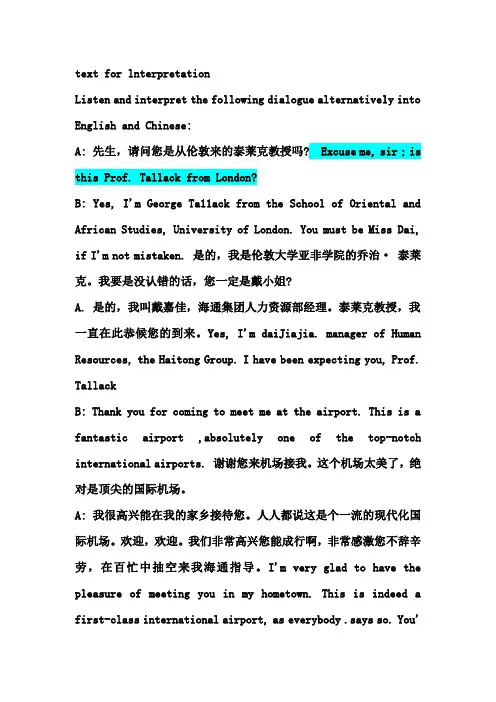
text for lnterpretationListen and interpret the following dialogue alternatively into English and Chinese:A: 先生,请问您是从伦敦来的泰莱克教授吗? Excuse me, sir ; is this Prof. Tallack from London?B: Yes, I'm George Ta11ack from the School of Oriental and African Studies, University of London. You must be Miss Dai, if I'm not mistaken. 是的,我是伦敦大学亚非学院的乔治·泰莱克。
我要是没认错的话,您一定是戴小姐?A. 是的,我叫戴嘉佳,海通集团人力资源部经理。
泰莱克教授,我一直在此恭候您的到来。
Yes, I'm daiJiajia. manager of Human Resources, the Haitong Group. I have been expecting you, Prof. TallackB: Thank you for coming to meet me at the airport. This is a fantastic airport ,absolutely one of the top-notch international airports. 谢谢您来机场接我。
这个机场太美了,绝对是顶尖的国际机场。
A: 我很高兴能在我的家乡接待您。
人人都说这是个一流的现代化国际机场。
欢迎,欢迎。
我们非常高兴您能成行啊,非常感激您不辞辛劳,在百忙中抽空来我海通指导。
I'm very glad to have the pleasure of meeting you in my hometown. This is indeed a first-class international airport, as everybody .says so. You're welcome. We're very happy that you made it in spite of the tiring trip. We're very grateful that you took time from your busy schedule and came to Haitong to give us advice.B: I've long been expecting to learn about the famous Haitong Group. 1 rea11y appreciate this opportunity , which is also an opportunity for me to learn about Chinese enterprises at a close distance.我一直希望能真正了解赫赫有名的"海通集团",你们也给了我近距离了解中国企业的机会,我感激不尽。
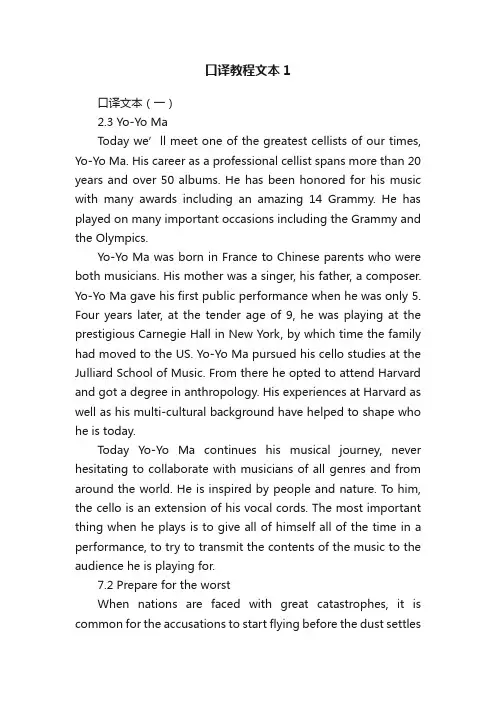
口译教程文本1口译文本(一)2.3 Yo-Yo MaToday we’ll meet one of the greatest cellists of our times, Yo-Yo Ma. His career as a professional cellist spans more than 20 years and over 50 albums. He has been honored for his music with many awards including an amazing 14 Grammy. He has played on many important occasions including the Grammy and the Olympics.Yo-Yo Ma was born in France to Chinese parents who were both musicians. His mother was a singer, his father, a composer. Yo-Yo Ma gave his first public performance when he was only 5. Four years later, at the tender age of 9, he was playing at the prestigious Carnegie Hall in New York, by which time the family had moved to the US. Yo-Yo Ma pursued his cello studies at the Julliard School of Music. From there he opted to attend Harvard and got a degree in anthropology. His experiences at Harvard as well as his multi-cultural background have helped to shape who he is today.Today Yo-Yo Ma continues his musical journey, never hesitating to collaborate with musicians of all genres and from around the world. He is inspired by people and nature. To him, the cello is an extension of his vocal cords. The most important thing when he plays is to give all of himself all of the time in a performance, to try to transmit the contents of the music to the audience he is playing for.7.2 Prepare for the worstWhen nations are faced with great catastrophes, it is common for the accusations to start flying before the dust settlesor any debris has even been cleared.Commentators are quick to raise a cry over government action or lack thereof, or whether the disaster could have been averted or its deadly consequences mitigated. This is especially true when many lives are lost and many more are at stake, and society is forced to cope with something terrible for the first time.There is always a steep learning curve when it comes to responding to calamities of this kind, and Mother Nature does an expert job of keeping us on our toes. The ability to expect the unexpected should perhaps be considered a necessary virtue for public officials.The Indian Ocean tsunami that wreaked havoc in southern Thailand and other neighboring countries is a perfect example of why that is so.New policies, organizations and procedures will spring up amid the devastation. Expensive new technologies will be deployed and bureaucrats shuffled around. The world of officialdom will appear to be in control, actively responding to needs and crises as they arise.As a society, the people of Thailand have demonstrated that they can come together and help one another in times of crisis. But we must now work much more resolutely to prepare for possible disasters, no matter how high or low their probability. We cannot just focus on the next tsunami because the next big catastrophe could equally well be something totally different and unexpected. We must prepare for the worst, no matter what form it may take.7.3 Extreme SportsIn the past, young sportspeople would play hockey or baseball. Today, they want risk and excitement --- the closer tothe edge the better. They snowboard over cliffs and mountain-bike down steep mountains. They wind-surf near hurricanes, go white-water rafting through rapids, and bungee-jump from towers. //Extreme sports started as an alternative to more expensive sports. A city kid who didn’t have the money to buy expensive sports equipment could get a skateboard and have fun. But now it has become a whole new area of sport, requiring specialized equipment and high levels of skill. There’s even a special Olympics for extreme sports, called the Winter X-Games, which include snow mountain-biking and ice-climbing. An Extreme Games competition is held each summer in Rhode Island. It features sports such as sky-surfing, where people jump from airplanes with surfboards attached to their feet. //What makes extreme sports so popular? I think the main reason is that people love the thrill. City people in particular want to be outdoors on weekends and do something challenging. With the new equipment available today people can take greater risks without getting hurt. And the risk itself is part of the appeal. Once you have been mountain biking or snow-boarding, it’s impossible to go b ack to cycling or skiing. They are just too boring. //Extreme sports are certainly not for everyone. Most people still prefer to play baseball or basketball or watch sports on TV. But extreme sports are definitely gaining in popularity. These fresh and exciting sports could well be the wave of the future.17.1 The new generation of China specialistsHaving walked through China’s hutong and rice paddies, lived on mantou and doufu, interviewed ganbu and accesseddang’an, experienced the daily life in danwei, ridden the ra ils hard seat across China, and possessing reasonable fluency in putonghua, the new generation of China specialists brings a “feel” and authenticity to their writing often absent in previous generation. (他们曾漫步于中国胡同里和稻田埂上,吃的是馒头和豆腐,与干部长谈过,查阅过档案,体验过单位的日常生化,坐着火车硬座游览了中国,同时能讲相当流利的普通话。
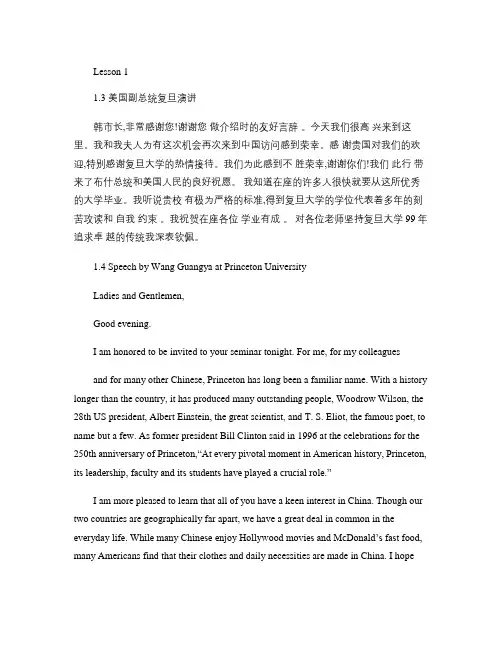
Lesson 11.3 美国副总统复旦演讲韩市长,非常感谢您!谢谢您做介绍时的友好言辞。
今天我们很高兴来到这里。
我和我夫人为有这次机会再次来到中国访问感到荣幸。
感谢贵国对我们的欢迎,特别感谢复旦大学的热情接待。
我们为此感到不胜荣幸,谢谢你们!我们此行带来了布什总统和美国人民的良好祝愿。
我知道在座的许多人很快就要从这所优秀的大学毕业。
我听说贵校有极为严格的标准,得到复旦大学的学位代表着多年的刻苦攻读和自我约束。
我祝贺在座各位学业有成。
对各位老师坚持复旦大学 99年追求卓越的传统我深表钦佩。
1.4 Speech by Wang Guangya at Princeton UniversityLadies and Gentlemen,Good evening.I am honored to be invited to your seminar tonight. For me, for my colleaguesand for many other Chinese, Princeton has long been a familiar name. With a history longer than the country, it has produced many outstanding people, Woodrow Wilson, the 28th US president, Albert Einstein, the great scientist, and T. S. Eliot, the famous poet, to name but a few. As former president Bill Clinton said in 1996 at the celebrations for the 250th anniversary of Princeton,“At every pivotal moment in American history, Princeton, its leadership, faculty and its students have played a crucial role.”I am more pleased to learn that all of you have a keen interest in China. Though our two countries are geographically far apart, we have a great deal in common in the everyday life. While many Chinese enjoy Hollywood movies and McDonald’s fast food, many Americans find that their clothes and daily necessities are made in China. I hopet hat today’s seminar will help you gain a better understanding of China and its foreign policy, thus deepening further our friendship and cooperation.1.5 新工厂落成典礼上的讲话各位尊敬的来宾,女士们,先生们:下午好!欢迎大家前来参加我们公司在中国的首家新厂房的落成典礼! 感谢各位拨冗光临,与我们共同庆祝这一盛大的活动!我谨代表公司对今天来参加典礼的各位供应商、客户嘉宾、各位员工和业务伙伴说声“谢谢! ”公司管理层深深为我们的新工厂感到骄傲,我们能干的员工感到骄傲, 他们发展了工厂的业务,使之达到国际水平。
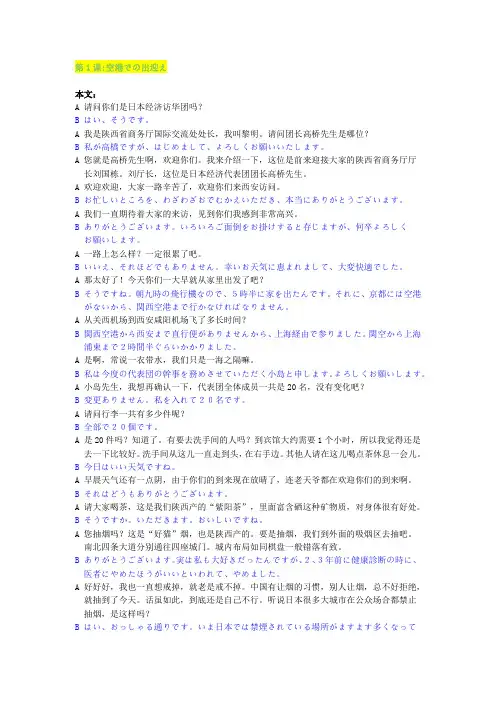
第1课:空港での出迎え本文:A 请问你们是日本经济访华团吗?B はい、そうです。
A 我是陕西省商务厅国际交流处处长,我叫黎明。
请问团长高桥先生是哪位?B 私が高橋ですが、はじめまして、よろしくお願いいたします。
A 您就是高桥先生啊,欢迎你们。
我来介绍一下,这位是前来迎接大家的陕西省商务厅厅长刘国栋。
刘厅长,这位是日本经济代表团团长高桥先生。
A 欢迎欢迎,大家一路辛苦了,欢迎你们来西安访问。
B お忙しいところを、わざわざおでむかえいただき、本当にありがとうございます。
A 我们一直期待着大家的来访,见到你们我感到非常高兴。
B ありがとうございます。
いろいろご面倒をお掛けすると存じますが、何卒よろしくお願いします。
A 一路上怎么样?一定很累了吧。
B いいえ、それほどでもありません。
幸いお天気に恵まれまして、大変快適でした。
A 那太好了!今天你们一大早就从家里出发了吧?B そうですね。
朝九時の飛行機なので、5時半に家を出たんです。
それに、京都には空港がないから、関西空港まで行かなければなりません。
A 从关西机场到西安咸阳机场飞了多长时间?B 関西空港から西安まで直行便がありませんから、上海経由で参りました。
関空から上海浦東まで2時間半ぐらいかかりました。
A 是啊,常说一衣带水,我们只是一海之隔嘛。
B 私は今度の代表団の幹事を務めさせていただく小島と申します。
よろしくお願いします。
A 小岛先生,我想再确认一下,代表团全体成员一共是20名,没有变化吧?B 変更ありません。
私を入れて20名です。
A 请问行李一共有多少件呢?B 全部で20個です。
A 是20件吗?知道了。
有要去洗手间的人吗?到宾馆大约需要1个小时,所以我觉得还是去一下比较好。
洗手间从这儿一直走到头,在右手边。
其他人请在这儿喝点茶休息一会儿。
B 今日はいい天気ですね。
A 早晨天气还有一点阴,由于你们的到来现在放晴了,连老天爷都在欢迎你们的到来啊。
B それはどうもありがとうございます。
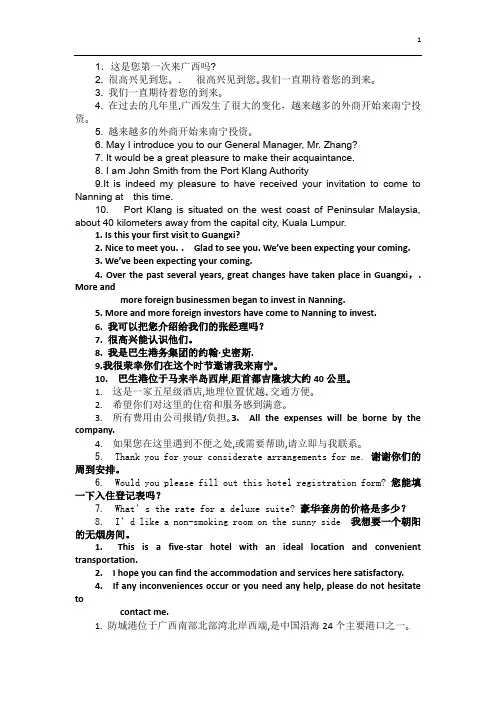
1.这是您第一次来广西吗?2. 很高兴见到您。. 很高兴见到您。我们一直期待着您的到来。3. 我们一直期待着您的到来。4. 在过去的几年里,广西发生了很大的变化,越来越多的外商开始来南宁投资。5. 越来越多的外商开始来南宁投资。6. May I introduce you to our General Manager, Mr. Zhang?7. It would be a great pleasure to make their acquaintance.8. I am John Smith from the Port Klang Authority9.It is indeed my pleasure to have received your invitation to come to Nanning at this time.10. Port Klang is situated on the west coast of Peninsular Malaysia, about 40 kilometers away from the capital city, Kuala Lumpur.1. Is this your first visit to Guangxi?2. Nice to meet you.. Glad to see you. We’ve been expecting your coming.3. We’ve been expecting y our coming.4. Over the past several years, great changes have taken place in Guangxi,. More andmore foreign businessmen began to invest in Nanning.5. More and more foreign investors have come to Nanning to invest.6. 我可以把您介绍给我们的张经理吗?7. 很高兴能认识他们。

Unit1- Text5Journalist:We are so pleased to be here today. As we know, in land size or population,Tunisia is comparatively small. But when it comes to tourism, Tunisia is really a developed and prosperous country. We wonder what makes Tunisia so attractive.//大使先生:首先,我们来看一下突尼斯独特的地理位置,它坐落于阿尔及利亚和利比亚之间的地中海北非海岸,是一个融合了多元文化的国度。
突尼斯有1,200 公里的海岸线,美丽的海滩,同时也有着3,000 多年的历史和文化遗产。
//Journalist:We believe that the development of tourism industry has everything to do with the efforts Tunisian government has made. //大使先生:当然了。
在任何一个国家,如果你要选择一个可以提供实质性经济增长的行业,那么首选就是旅游业。
一个旅游目的地有五大支柱。
第一个是安全。
突尼斯享有长久的安全和稳定,而且在媒体如此发达的今天,你也几乎听不到来突尼斯的游客发生过什么意外。
第二,我们有清洁的环境。
当然接下来还需要提供完善的设施: 马路、高速公路、还有海路和空路等其他交通方式。
同时我们还有完善的健康保障体系和银行系统。
我们为外国友人提供了这些设施,而这保证了我国经济的长久发展。
除此之外,在突尼斯,每个人至少都能说三门语言:阿拉伯语、法语和英语,因为我国实行义务教育制度。
通过发展旅游业,人们有更多的机会和外国人交流,变得更加开放和友好。
//Journalist: We know the Tunisian government has attached great importance to promoting tourism relation with China. For example, the Tourism Minister of Tunisia visited China in 2005. But it seems that there are still not so many Chinese tourists there. What do you think is the main reason for that? //大使先生:现在我们每年接待450 万名游客,来自罗马尼亚、西班牙、法国、意大利、日本和其他国家。
《口译教程》汉英翻译参考译文Lesson 11.3 美国副总统复旦演讲韩市长,非常感谢您!谢谢您做介绍时的友好言辞。
今天我们很高兴来到这里。
我和我夫人为有这次机会再次来到中国访问感到荣幸。
感谢贵国对我们的欢迎,特别感谢复旦大学的热情接待。
我们为此感到不胜荣幸,谢谢你们!我们此行带来了布什总统和美国人民的良好祝愿。
我知道在座的许多人很快就要从这所优秀的大学毕业。
我听说贵校有极为严格的标准,得到复旦大学的学位代表着多年的刻苦攻读和自我约束。
我祝贺在座各位学业有成。
对各位老师坚持复旦大学99年追求卓越的传统我深表钦佩。
1.4 Speech by Wang Guangya at Princeton UniversityLadies and Gentlemen,Good evening.I am honored to be invited to your seminar tonight. For me, for my colleagues and for many other Chinese, Princeton has long been a familiar name. With a history longer than the country,that has produced many outstanding people, Woodrow Wilson, the 28 US president, Albert Einstein,the great scientist, and T. S. Eliot, the famous poet, to name but a few. As former president Bill Clinton said in 1996 at the c elebrations for the 250th anniversary of Princeton, “At every pivotal moment in American history, Princeton, its leadership, faculty and its students have played a crucial role.”I am more pleased to learn that all of you have a keen interest in China. Though our two countries are geographically far apart, we have a great deal in common in the everyday life. While many Chinese enjoy Hollywood movies and McDonald’s fast food, many Americans find that their clothes and daily necessities are made in China.I h ope that today’s seminar will help you gain a better understanding of China and its foreign policy, thus deepening further our friendship and cooperation.1.5 新工厂落成典礼上的讲话各位尊敬的来宾,女士们,先生们:下午好!欢迎大家前来参加我们公司在中国的首家新厂房的落成典礼!感谢各位拨冗光临,与我们共同庆祝这一盛大的活动!我谨代表公司对今天来参加典礼的各位供应商、客户嘉宾、各位员工和业务伙伴说声“谢谢!” 公司管理层深深为我们的新工厂感到骄傲,我们能干的员工感到骄傲,他们发展了工厂的业务,使之达到国际水平。
Unit1口译上课内容1. 女士们,先生们,各位贵宾:我谨代表我公司,并于我个人的名义,对各位表示热烈的欢迎!<Ladies and gentlemen as well as the distinguished guests: On behalf of my company as well asin my personal name, I’d like to extend warm welcome to y ou all!>2. 今晚我们请到了从伦敦远道而来的贵宾们与我们一起共度中秋佳节,我为此感到非常地荣幸!这些良好的印象将永远珍藏在我们美好的记忆之中。
< Tonight, I feel deeply privileged (honored) to have the dist inguished friends who comeall the way from London to celebrate the Mid-autumn Festiv al with us. These fine impressions will forever remain in our cher ished memories.>3. 今天,我很高兴也很荣幸能在这里与大家欢聚一堂,这使我有机会拜访老朋友,结识新朋友!< Today, It gives me such a pleasure and honor to have the j oyful gathering with you all here,which gives me such a great opportunity to visit the old frie nds and meet the new ones.>4. 我为能在此设宴招待切尼副总统和夫人以及其他贵宾而深感荣幸和愉快!我愿借此机会向各位来宾表示热烈的欢迎!<It is indeed my great honor and pleasure to host the banq uet here in honor of Vice President Chineyand Mrs. Chiney. I’d like to avail myself of this great opport unity to extend warm welcometo all the distinguished guests.>5. 在这美丽无比的金秋季节,我们在北京迎来了第四届世界妇女大会的召开!为此,我们热烈欢呼第四届世界妇女大会的召开,并预祝大会圆满成功!< In this most beautiful season of golden autumn, we in Beij ing welcome the openingof the 4th World Conference on Women. In this connection, we warmly herald the opening of it and wish it a complete s uccess! >6. 我很荣幸地代表中国政府和人民向来自联合国代表团的代表表示热烈的欢迎!<It is my great honor to express the warm welcome to the d elegates from theUN delegation on behalf of the Chinese Government and its people.>7. 承蒙由如此杰出的人士组成的团体造访本公司,实属莫大的愉快!< It is indeed my pleasure to receive the visit to our compan y fromsuch a distinguished group of talents like you.>8 我想对贵方的友好接待和盛情款待表示衷心的感谢。
口译文本(一)2.3 Yo-Yo MaToday we’ll meet one of the greatest cellists of our times, Yo-Yo Ma. His career as a professional cellist spans more than 20 years and over 50 albums. He has been honored for his music with many awards including an amazing 14 Grammy. He has played on many important occasions including the Grammy and the Olympics.Yo-Yo Ma was born in France to Chinese parents who were both musicians. His mother was a singer, his father, a composer. Yo-Yo Ma gave his first public performance when he was only 5. Four years later, at the tender age of 9, he was playing at the prestigious Carnegie Hall in New York, by which time the family had moved to the US. Yo-Yo Ma pursued his cello studies at the Julliard School of Music. From there he opted to attend Harvard and got a degree in anthropology. His experiences at Harvard as well as his multi-cultural background have helped to shape who he is today.Today Yo-Yo Ma continues his musical journey, never hesitating to collaborate with musicians of all genres and from around the world. He is inspired by people and nature. To him, the cello is an extension of his vocal cords. The most important thing when he plays is to give all of himself all of the time in a performance, to try to transmit the contents of the music to the audience he is playing for.7.2 Prepare for the worstWhen nations are faced with great catastrophes, it is common for the accusations to start flying before the dust settles or any debris has even been cleared.Commentators are quick to raise a cry over government action or lack thereof, or whether the disaster could have been averted or its deadly consequences mitigated. This is especially true when many lives are lost and many more are at stake, and society is forced to cope with something terrible for the first time.There is always a steep learning curve when it comes to responding to calamities of this kind, and Mother Nature does an expert job of keeping us on our toes. The ability to expect the unexpected should perhaps be considered a necessary virtue for public officials.The Indian Ocean tsunami that wreaked havoc in southern Thailand and other neighboring countries is a perfect example of why that is so.New policies, organizations and procedures will spring up amid the devastation. Expensive new technologies will be deployed and bureaucrats shuffled around. The world of officialdom will appear to be in control, actively responding to needs and crises as they arise.As a society, the people of Thailand have demonstrated that they can come together and help one another in times of crisis. But we must now work much more resolutely to prepare for possible disasters, no matter how high or low their probability. We cannot just focus on the next tsunami because the next big catastrophe could equally well be something totally different and unexpected. We must prepare for the worst, no matter what form it may take.7.3 Extreme SportsIn the past, young sportspeople would play hockey or baseball. Today, they want risk and excitement --- the closer to the edge the better. They snowboard over cliffs and mountain-bike down steep mountains. They wind-surf near hurricanes, go white-water rafting through rapids, and bungee-jump from towers. //Extreme sports started as an alternative to more expensive sports. A city kid who didn’t have the money to buy expensive sports equipment could get a skateboard and have fun. But now it has become a whole new area of sport, requiring specialized equipment and high levels of skill. There’s even a special Olympics for extreme sports, called the Winter X-Games, which include snow mountain-biking and ice-climbing. An Extreme Games competition is held each summer in Rhode Island. It features sports such as sky-surfing, where people jump from airplanes with surfboards attached to their feet. //What makes extreme sports so popular? I think the main reason is that people love the thrill. City people in particular want to be outdoors on weekends and do something challenging. With the new equipment available today people can take greater risks without getting hurt. And the risk itself is part of the appeal. Once you have been mountain biking or snow-boarding, it’s impossible to go b ack to cycling or skiing. They are just too boring. //Extreme sports are certainly not for everyone. Most people still prefer to play baseball or basketball or watch sports onTV. But extreme sports are definitely gaining in popularity. These fresh and exciting sports could well be the wave of the future.17.1 The new generation of China specialistsHaving walked through China’s hutong and rice paddies, lived on mantou and doufu, interviewed ganbu and accessed dang’an, experienced the daily life in danwei, ridden the rails hard seat across China, and possessing reasonable fluency in putonghua, the new generation of China specialists brings a “feel” and authenticity to their writing often absent in previous generation. (他们曾漫步于中国胡同里和稻田埂上,吃的是馒头和豆腐,与干部长谈过,查阅过档案,体验过单位的日常生化,坐着火车硬座游览了中国,同时能讲相当流利的普通话。